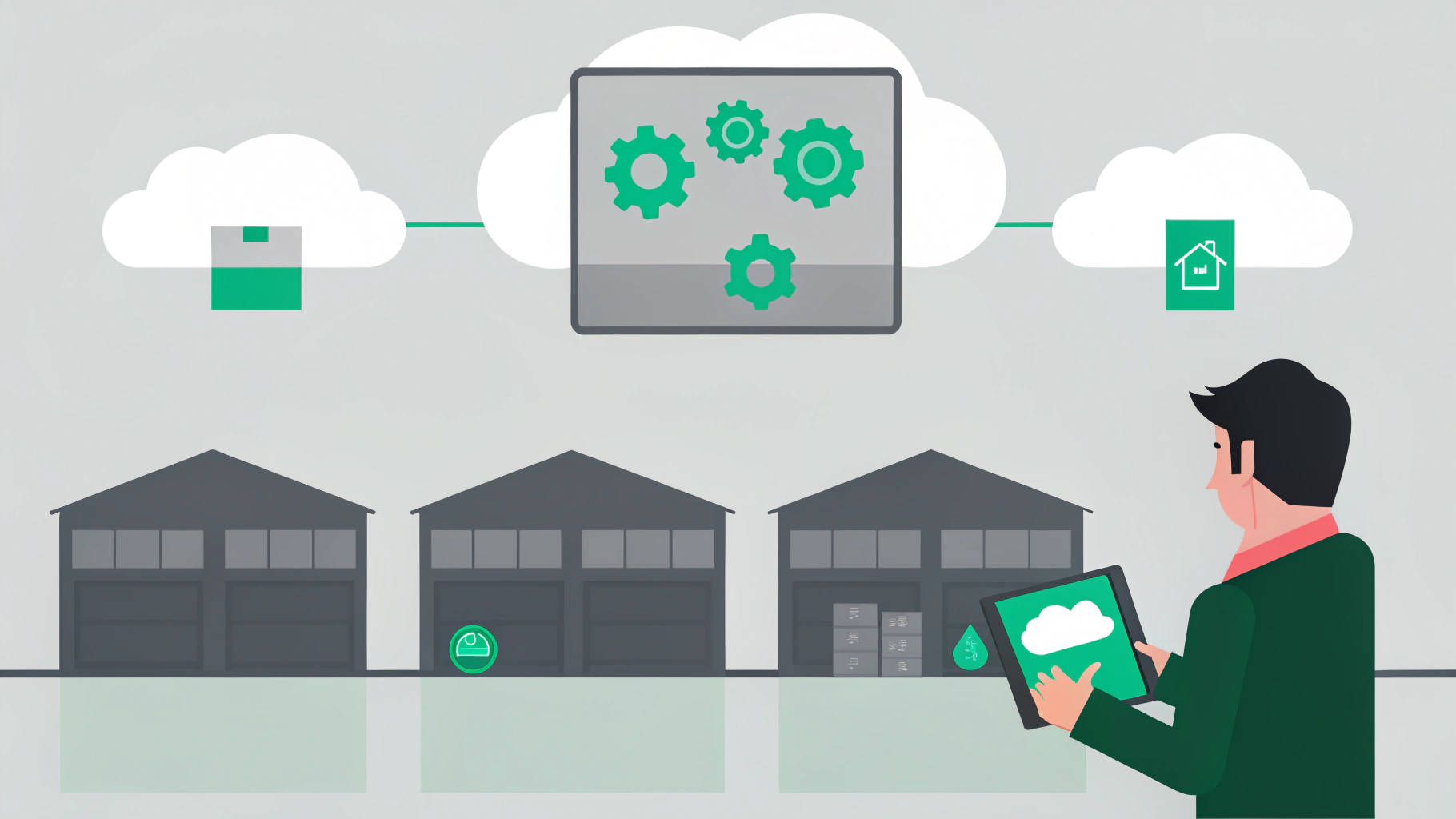Overview
This article identifies seven essential retail supply chain software solutions projected to be crucial for businesses in 2025. It underscores the significance of these solutions—real-time data processing, AI-driven insights, and sustainability features—critical for enhancing operational efficiency, improving decision-making, and meeting evolving consumer demands in a competitive retail landscape.
As we look ahead, the importance of these software solutions cannot be overstated. They are not merely tools; they are integral to navigating the complexities of the retail environment. By leveraging real-time data processing, businesses can respond swiftly to market changes. AI-driven insights offer a deeper understanding of consumer behavior, enabling more informed decisions. Furthermore, sustainability features are increasingly vital as consumers demand responsible practices from brands.
In conclusion, adopting these software solutions will empower businesses to thrive in 2025 and beyond. The time to act is now—embrace these innovations to secure a competitive edge in the retail landscape.
Introduction
In an industry where efficiency and adaptability reign supreme, the right supply chain software can significantly impact retailers striving to excel in 2025. This article explores seven vital software solutions that not only optimize operations but also enable businesses to swiftly adapt to market demands and consumer expectations. With the rapid evolution of technology, how can retailers ensure they select the most effective tools to navigate the complexities of modern supply chain management?
10X ERP: Real-Time Data Processing for Enhanced Decision-Making
10X ERP captures attention with its robust real-time data processing capabilities, empowering distributors to make informed decisions swiftly. As a 100% cloud-based retail supply chain software solution, it provides up-to-the-minute insights into inventory levels, sales trends, and financial performance. This ensures that businesses can respond proactively to market changes. This contemporary platform, featuring retail supply chain software, is particularly advantageous for expanding distributors who must adjust rapidly to customer needs and enhance their logistics operations efficiently.
With features such as flexible user permissions, built-in reporting, and seamless integrations, the retail supply chain software 10X ERP significantly enhances and supports strategic decision-making. The transparent pricing structure and rapid onboarding process allow businesses to easily understand the value they receive and begin utilizing the software without delay. Furthermore, 10X ERP prioritizes data integrity and security through premium cloud hosting and continuous data backup. This provides distributors with peace of mind as they manage their operations effectively.
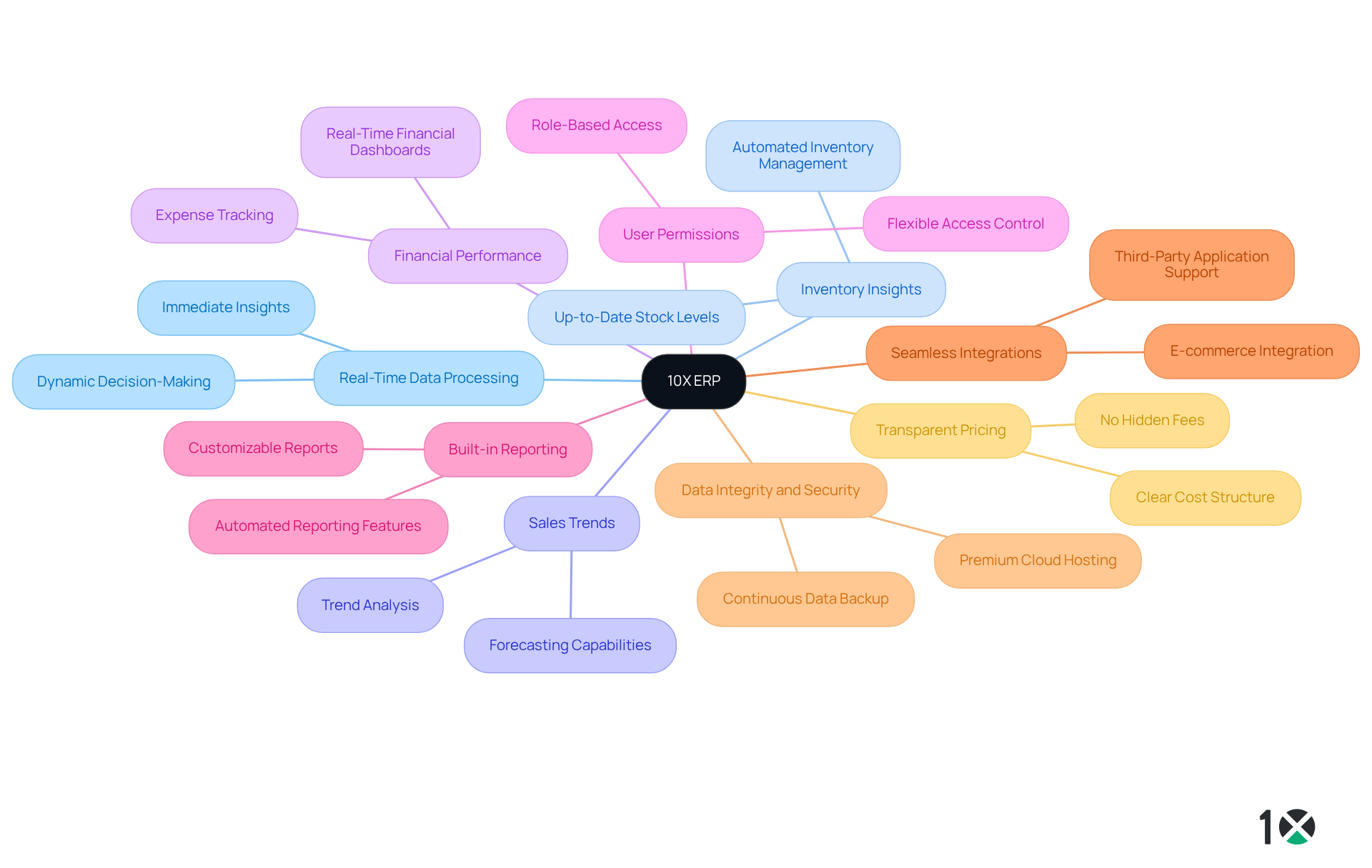
Blue Yonder: AI-Driven Insights for Supply Chain Optimization
Blue Yonder harnesses the power of artificial intelligence to deliver practical insights that significantly enhance logistics processes. By analyzing historical data and forecasting future trends, sellers can optimize their inventory management, leading to substantial cost savings. This AI-driven methodology empowers companies to anticipate customer needs proactively and adjust their logistics strategies accordingly, ensuring competitiveness in an ever-evolving market landscape.
For instance, retailers employing Blue Yonder’s AI solutions have experienced a 12% improvement in forecast accuracy. This improvement translates into a remarkable and a 50% reduction in operational costs. Additionally, logistics expenses are reduced by 15% through AI-enabled oversight, underscoring the financial advantages of these technologies.
However, it is crucial to acknowledge that companies typically allocate 60-70% of their project budgets to data preparation, with 62% of AI initiatives surpassing their budgets. These figures highlight the financial hurdles that can accompany AI adoption. As noted by a logistics specialist, ‘AI is revolutionizing stock oversight, but organizations must navigate the intricacies of execution to fully harness its advantages.’ Such advancements in retail supply chain software not only streamline inventory control but also enhance overall service levels, enabling retailers to meet consumer expectations effectively.
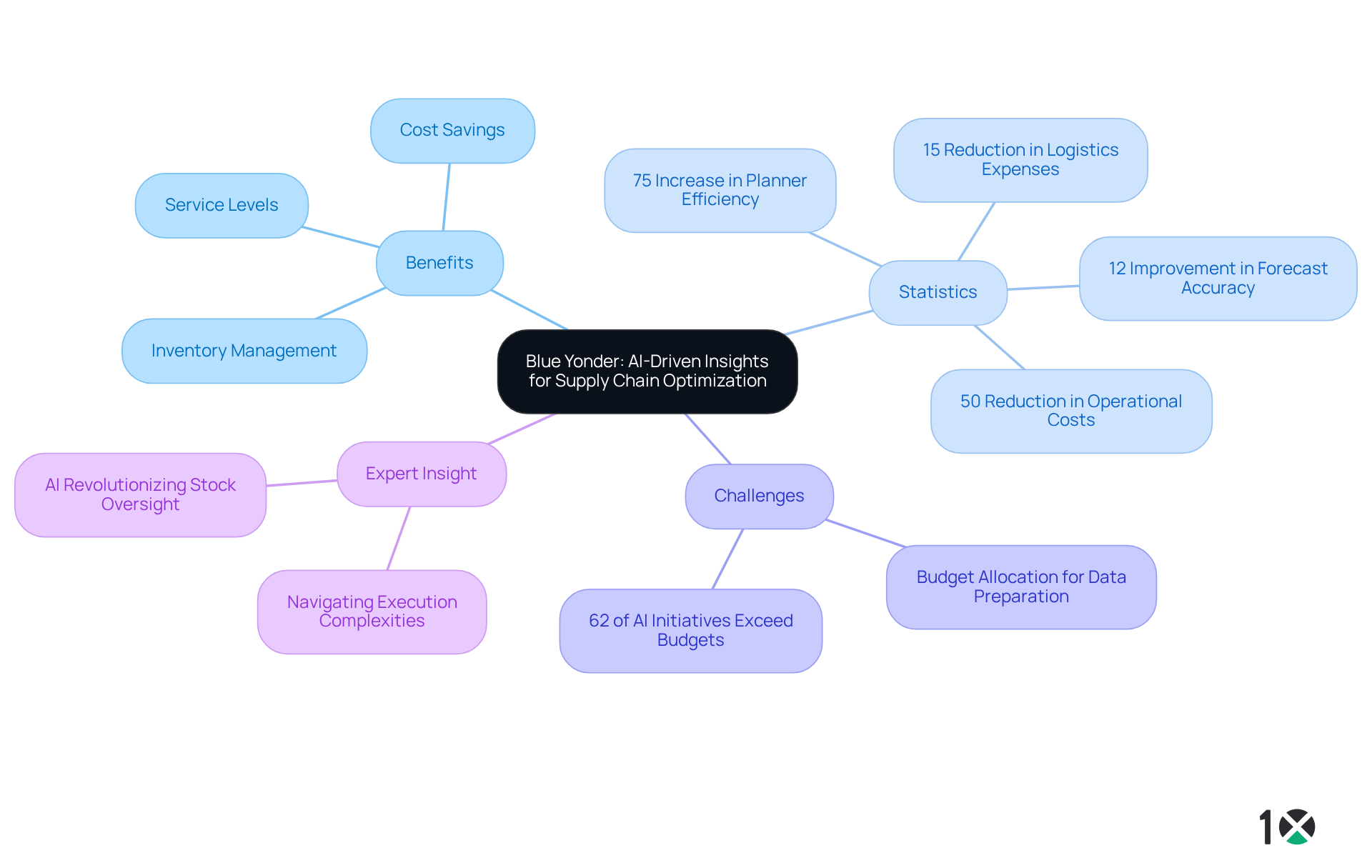
Kinaxis: Agile Supply Chain Orchestration for Retail Success
10X ERP presents a powerful cloud-based ERP solution tailored specifically for distributors, utilizing retail supply chain software to facilitate real-time data processing and seamless integrations. This innovative software empowers operations managers to elevate their logistics through adaptable user permissions, a comprehensive audit trail, and integrated reporting capabilities.
Cookies, small text files placed on devices by websites, play a crucial role in remembering user preferences and enhancing the overall software experience. With and robust cross-referencing capabilities, 10X ERP, a type of retail supply chain software, ensures that businesses maintain precise inventory oversight and can swiftly respond to market changes.
By leveraging these advanced features, distributors can significantly enhance customer satisfaction and improve profitability through effective inventory control.
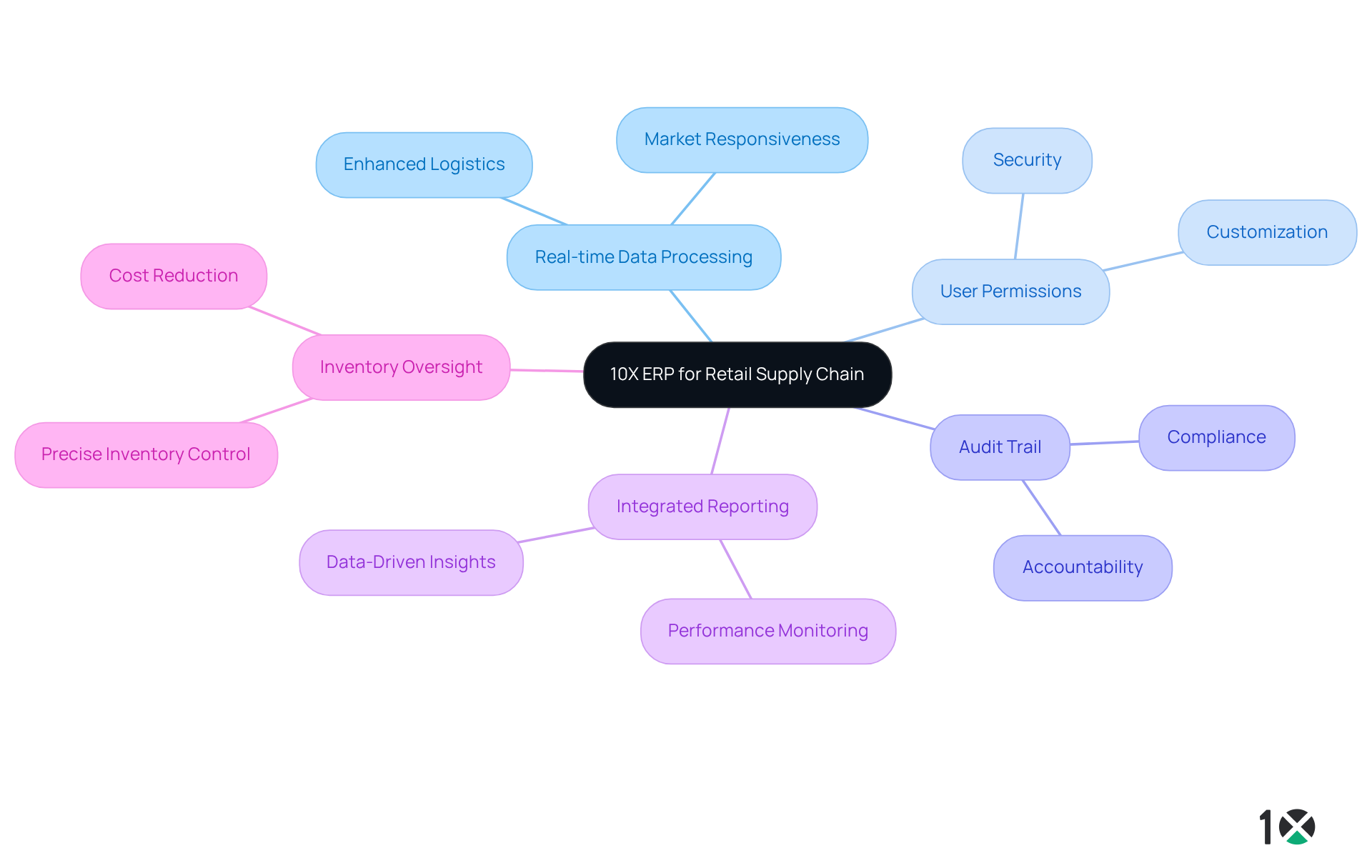
Oracle SCM: Comprehensive Tools for Streamlined Supply Chain Management
Oracle SCM presents a robust suite of tools designed to optimize logistics management. Covering the spectrum from procurement to logistics, Oracle’s retail supply chain software empowers retailers to enhance their operational efficiency. The platform’s powerful analytics capabilities provide companies with insights into their logistics performance, enabling them to identify areas for improvement and drive operational excellence.
In a context where global logistics disruptions have led to financial losses averaging approximately 8% of annual revenues, the importance of effective management of these processes cannot be overstated. Retailers leveraging Oracle SCM have reported significant operational enhancements, with leading firms achieving up to 20% reductions in operating expenses and 11% increases in earnings before interest and taxes (EBIT) through the use of retail supply chain software for efficient logistics digitization.
Analysts emphasize that the application of analytics is crucial for improving logistical performance, as it supports data-driven decision-making and fosters agility in responding to market changes. For instance, AI-powered tools within Oracle Fusion Cloud SCM have proven to enhance visibility and decision-making capabilities, further underscoring the benefits of adopting Oracle SCM.
Nevertheless, it is crucial to acknowledge that 90% of surveyed companies lack the necessary talent to meet their digitization goals, highlighting a significant barrier that organizations face in fully harnessing these analytics capabilities. With Oracle SCM, retailers can effectively utilize retail supply chain software and analytics tools to , ensuring they remain competitive in an ever-evolving environment.
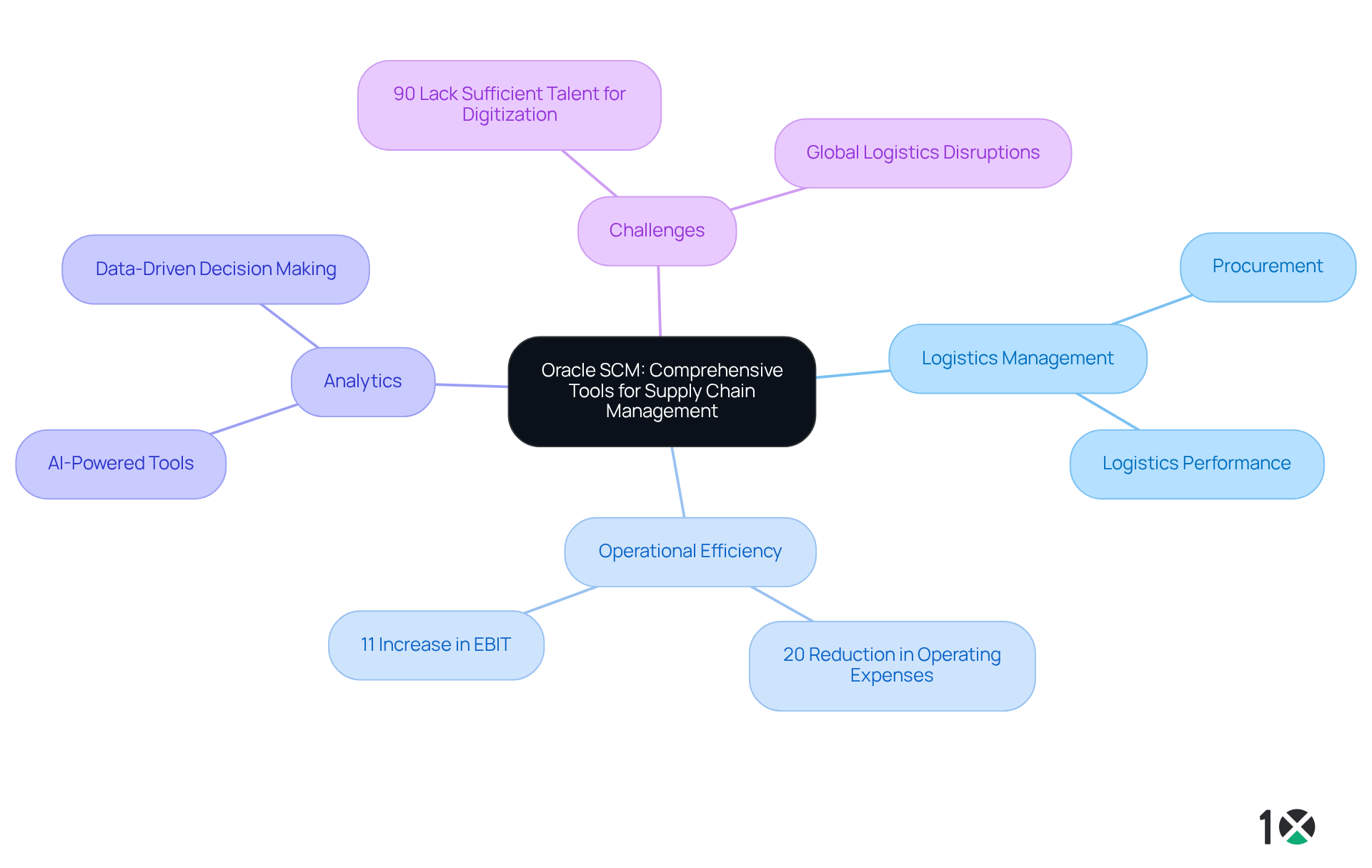
Tecsys: Industry-Specific Solutions for Retail Supply Chain Challenges
10X ERP delivers a cloud-based ERP solution specifically designed to address the unique challenges faced by distributors in logistics. By focusing on the distinct needs of the distribution sector, 10X ERP enhances inventory oversight, facilitates real-time data processing, and provides operational flexibility. This targeted approach allows distributors to , significantly improving efficiency and elevating customer satisfaction.
Notably, 55% of logistics leaders are investing in technology and innovation to overcome these challenges, underscoring the importance of tailored inventory tools that deliver critical data insights and control throughout the logistics process. Experts assert that customized solutions are vital for optimizing inventory management efficiency, enabling businesses to respond swiftly to market demands and consumer expectations.
10X ERP exemplifies this commitment by offering tools that not only meet but anticipate the evolving needs of distributors, ensuring their competitiveness in a rapidly changing landscape. Many distributors have successfully optimized their operations with 10X ERP, leveraging its advanced features to enhance visibility and control within their logistics, ultimately resulting in improved service levels and increased customer loyalty.
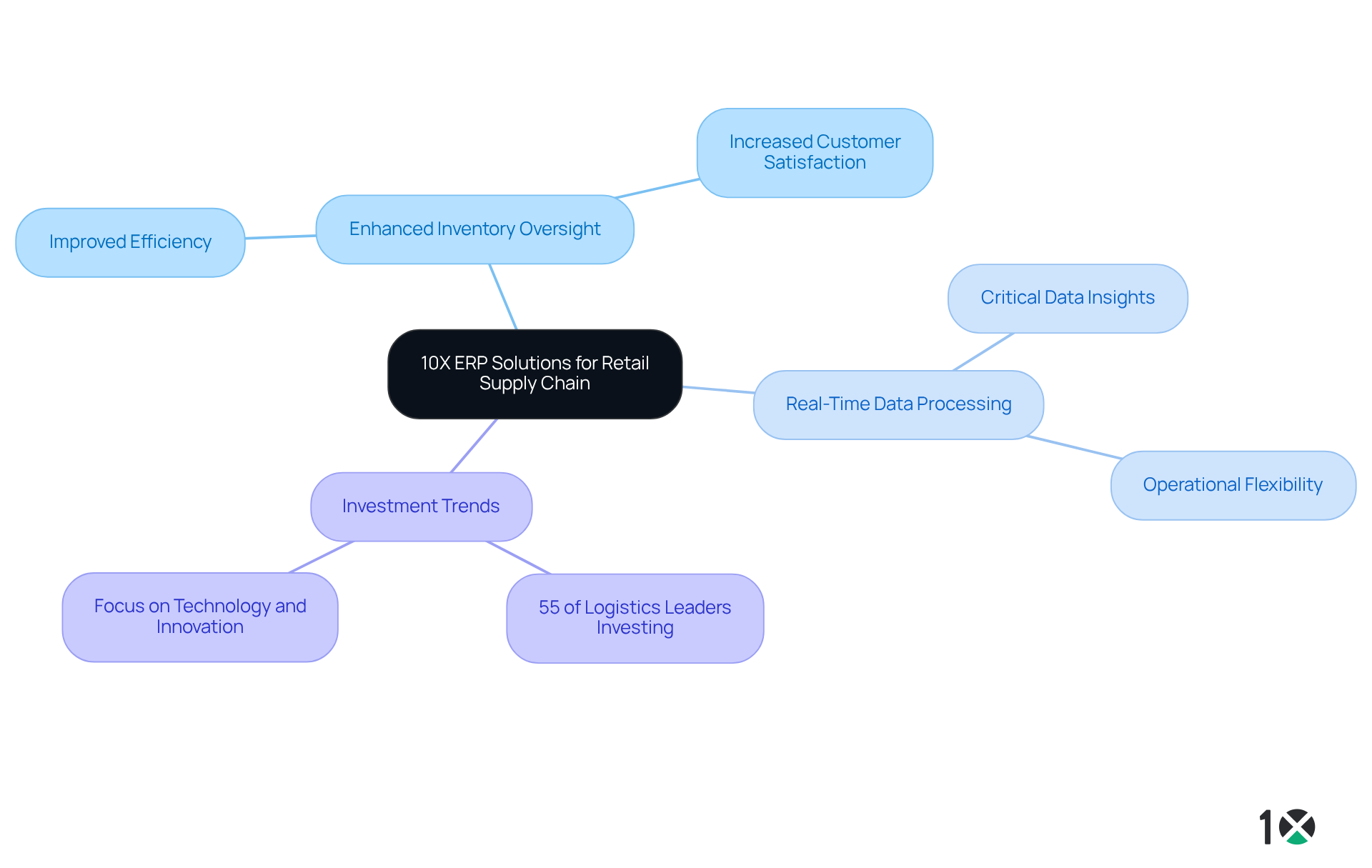
Investopedia: Educational Resources on Supply Chain Fundamentals
Investopedia serves as an essential resource for sellers aiming to enhance their understanding of logistics fundamentals. With a , it addresses critical concepts, best practices, and emerging industry trends. This educational framework not only equips businesses with the knowledge necessary for informed decision-making but also cultivates a culture of continuous learning. Such an approach is crucial for navigating the dynamic retail landscape, where adaptability and informed strategies are vital.
Ongoing education significantly influences logistics decision-making, empowering businesses to respond effectively to market shifts and optimize their operations. By investing in knowledge, companies position themselves to thrive amidst challenges and capitalize on opportunities. Are you ready to leverage the insights from Investopedia to transform your logistics strategy? Embrace this resource today and unlock the potential for growth and efficiency in your operations.
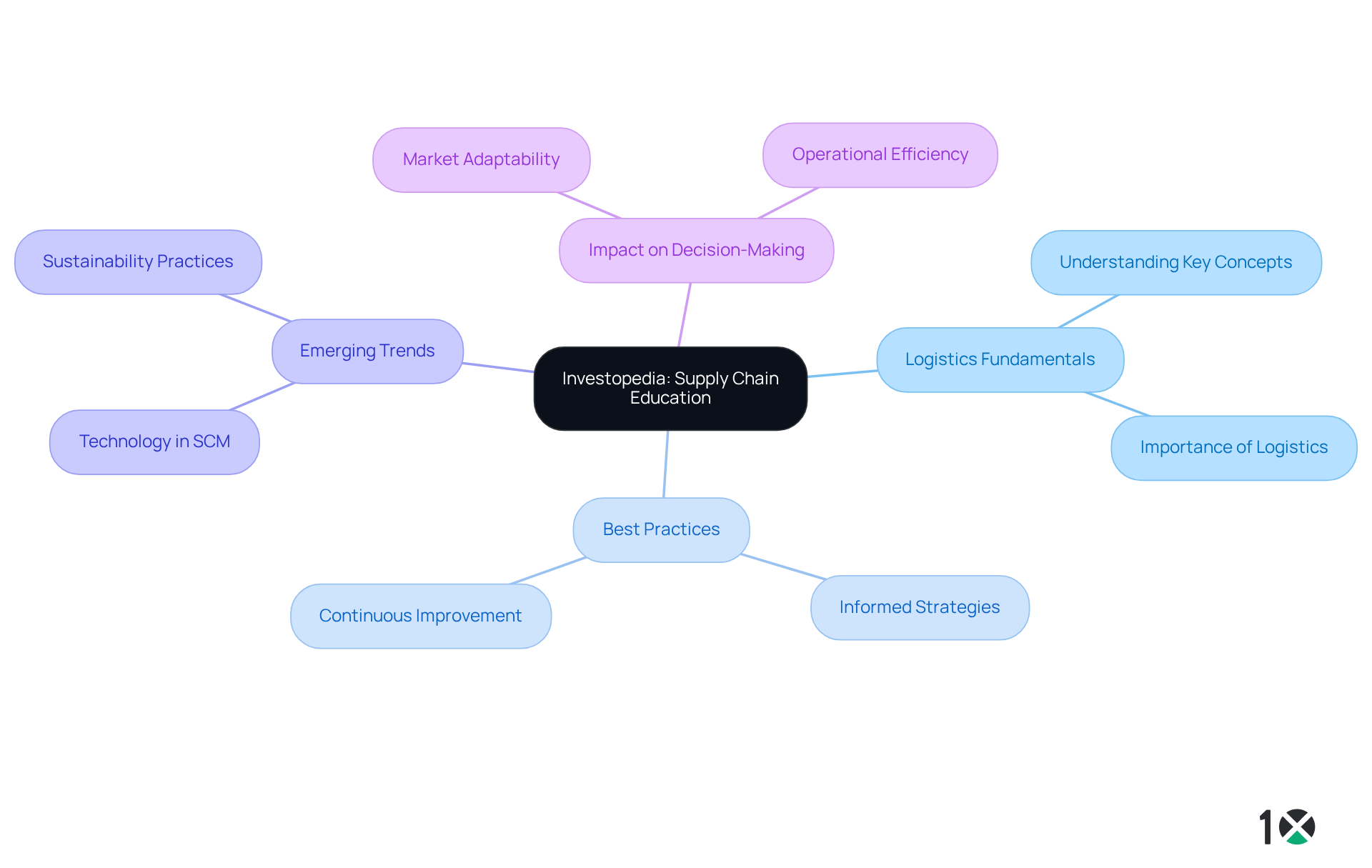
Supply Chain Brain: Insights on Trends and Innovations in Supply Chain Management
Supply Network Brain offers critical insights into the latest trends and advancements in logistics management, empowering retailers to navigate the complexities of the industry. With 65% of logistics leaders acknowledging the , it is crucial to stay informed about emerging technologies and regulatory changes. This proactive stance allows businesses to refine their strategies and maintain a competitive edge in a swiftly evolving market.
Recent statistics reveal that 93% of senior logistics executives plan to enhance the flexibility and resilience of their networks, underscoring the necessity of adopting innovative solutions. Retailers are increasingly utilizing advanced technologies such as AI and automation to streamline operations and boost efficiency. Notably, 40% of companies are concentrating on electrification and natural resource management to promote sustainability within their networks.
Industry leaders highlight the transformative potential of these technologies. As Dave Waters, a thought leader in logistics and AI, notes, “Artificial Intelligence will transform the distribution network in ways that haven’t even been envisioned yet.” This sentiment is echoed by numerous vendors who are adapting their logistics processes to incorporate these advancements, ensuring they meet customer expectations and enhance overall performance.
By engaging with resources like Supply Chain Brain, businesses can not only stay abreast of the latest innovations in retail supply chain software but also implement best practices that enhance operational success and elevate customer satisfaction.
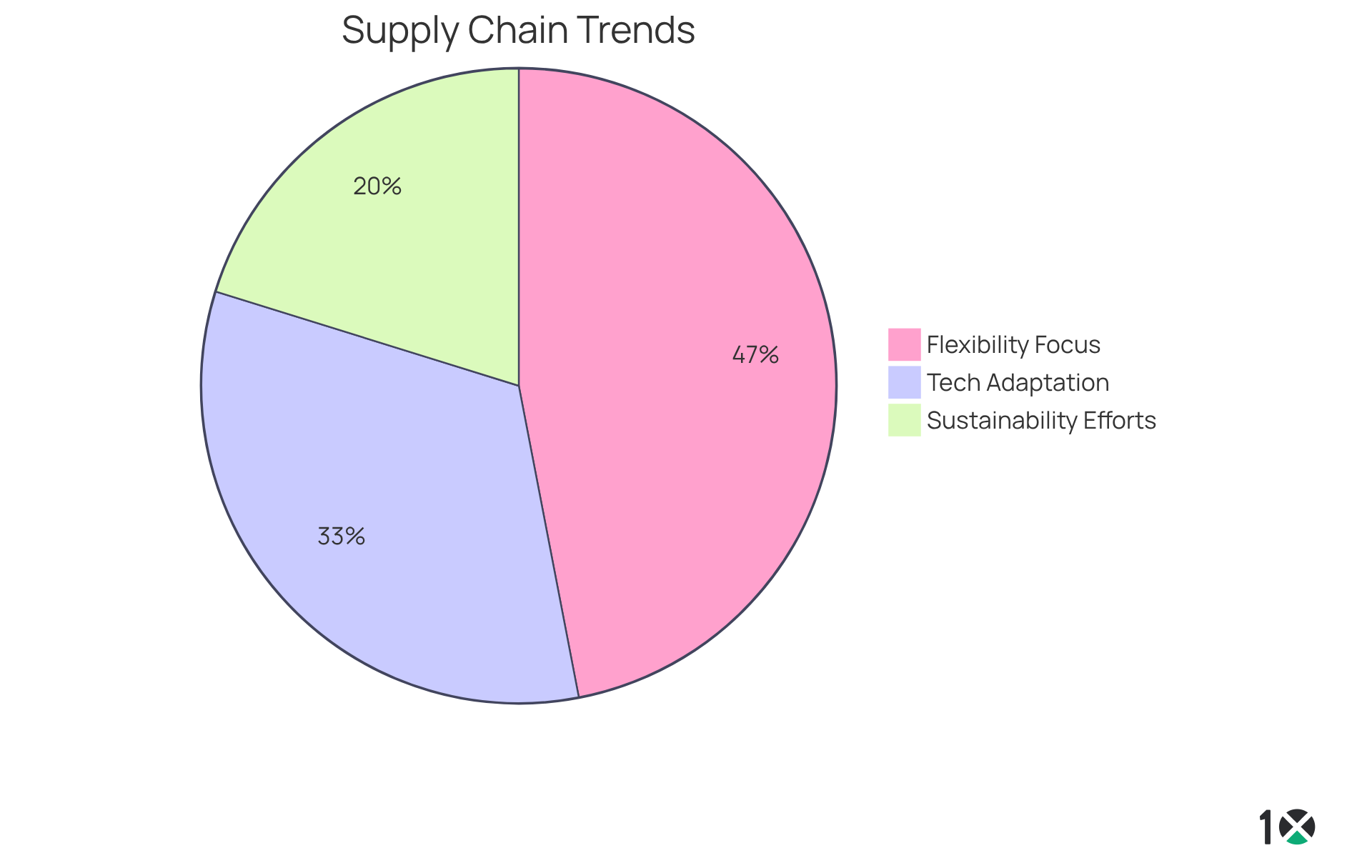
Blockchain Integration: Enhancing Traceability and Trust in Retail Supply Chains
Incorporating blockchain technology enables retailers to significantly enhance traceability and trust within their networks. By establishing immutable records of transactions, businesses ensure a high level of transparency and accountability. This is crucial for consumers who increasingly seek clarity about the origins of their products, fostering deeper trust and loyalty.
Specialists in the field emphasize that the clarity offered by blockchain not only enhances operational effectiveness but also strengthens connections with stakeholders, ultimately resulting in a more resilient network. As Fatma Gül Yazıcılar Sola observes, “Blockchain technology plays an essential role in logistics due to its characteristics, including unalterability of data, traceability, and transparency.”
For instance, large retailers such as Walmart and Nestlé have effectively adopted blockchain solutions to monitor product paths from origin to shelf, showcasing the technology’s transformative ability in logistics practices and its capacity to satisfy consumer demands.
Furthermore, the blockchain sector in logistics management is projected to reach approximately USD 17.15 billion by 2030, underscoring the growing significance of this technology in enhancing transparency and trust within the network.
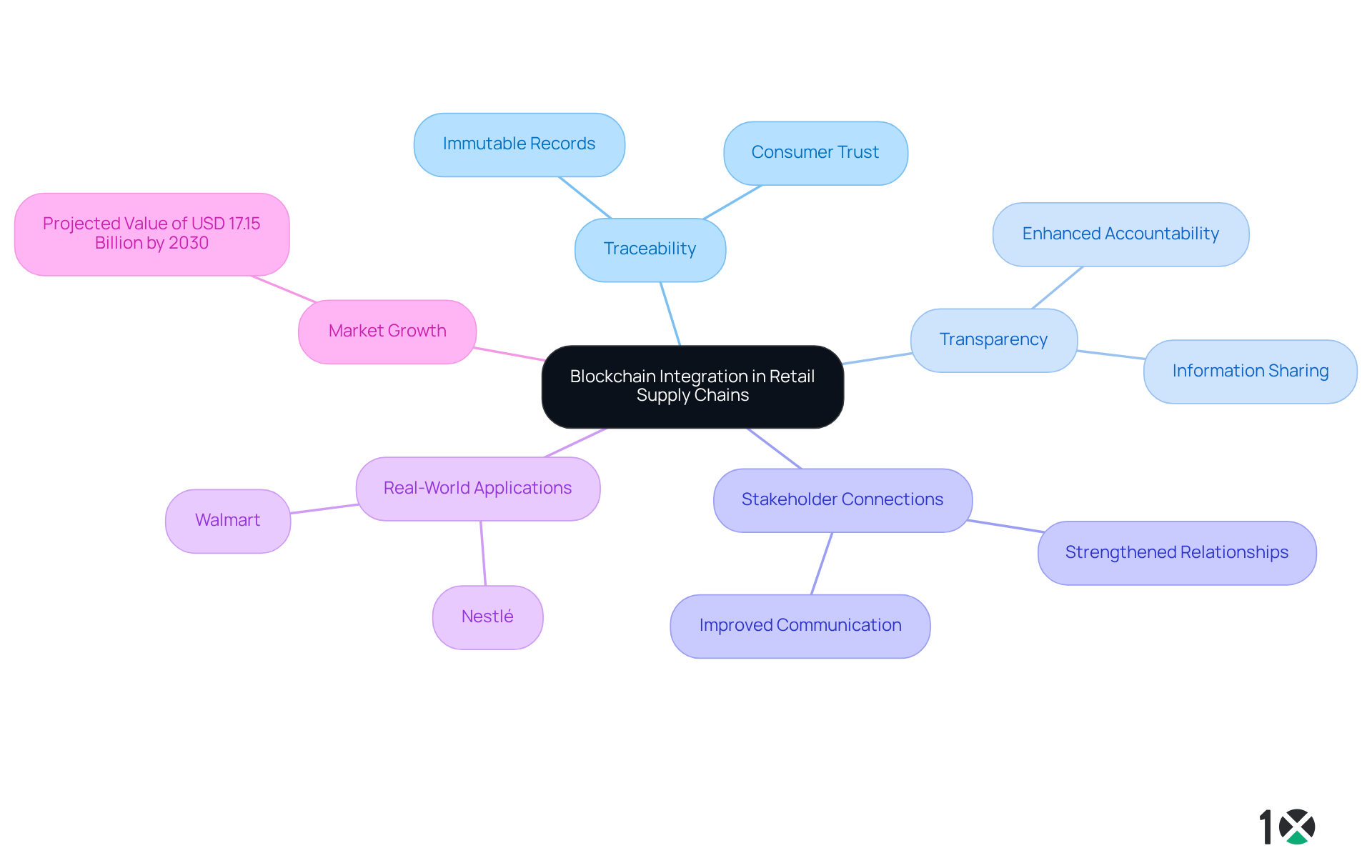
Sustainability Features: Supporting Eco-Friendly Practices in Retail Supply Chains
Sustainability attributes in logistics software are crucial for promoting that resonate with today’s environmentally conscious consumers. By integrating sustainability into their operations, businesses can significantly reduce waste, lower carbon footprints, and promote ethical sourcing. Such initiatives not only enhance brand reputation but also attract a growing segment of consumers who prioritize sustainability in their purchasing decisions.
Consider this:
- 78% of consumers believe environmental sustainability is important.
- 62% of U.S. adults frequently seek sustainable products.
Retailers embracing these practices are witnessing a shift in consumer preferences, with sustainable products growing 2.7 times faster than conventional counterparts and capturing a 32% share of market growth. Industry leaders assert that incorporating sustainability into logistics is not merely a trend; it is essential for long-term growth and customer loyalty.
As Evan Sheehan observes, “The commitment to sustainability frameworks and regulations is becoming progressively vital,” underscoring the urgent need for businesses to align their operations with consumer values and environmental responsibilities. Furthermore, leveraging social media can enhance visibility for these eco-friendly practices, further engaging consumers who are increasingly influenced by online platforms.
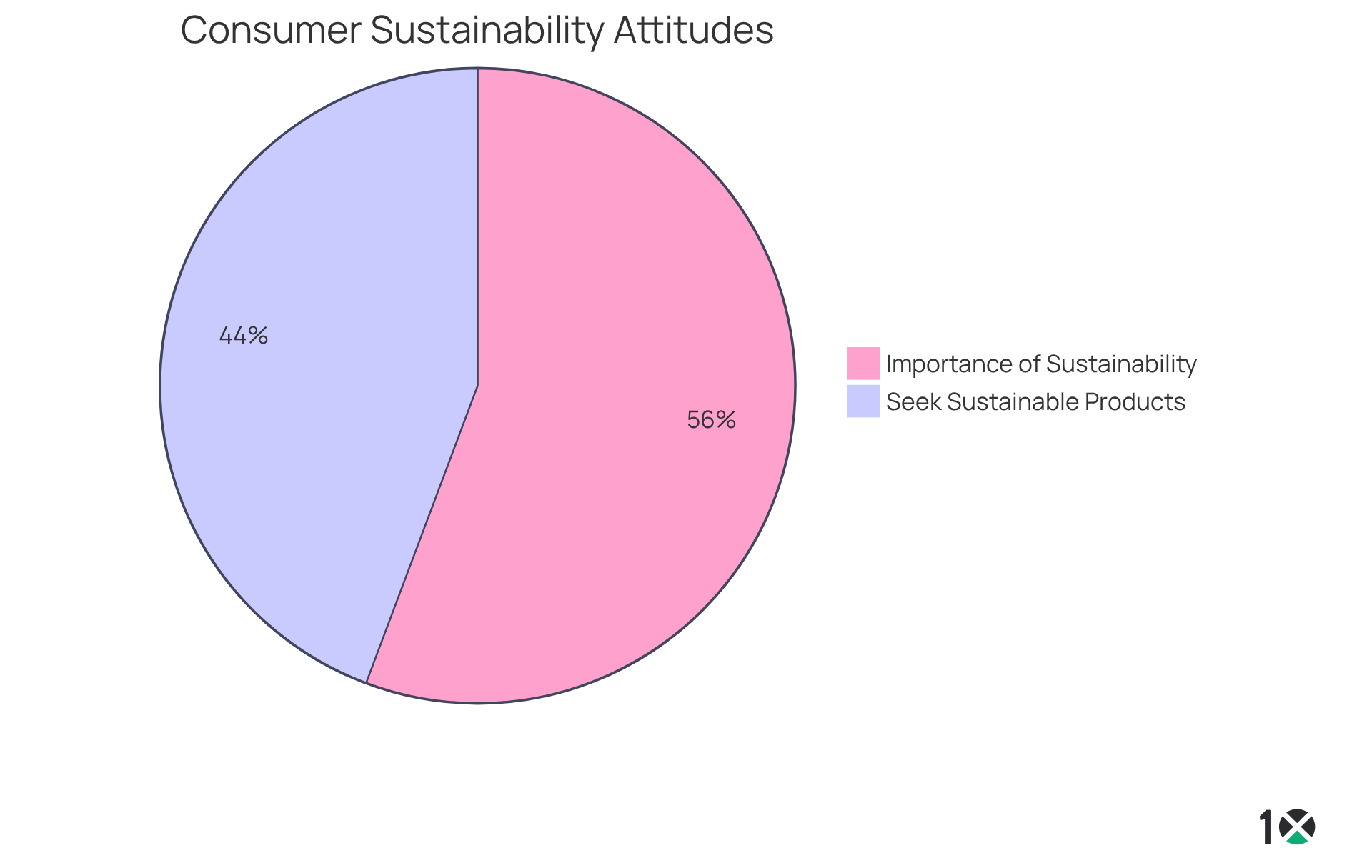
Returns Management: Streamlining the Process for Retail Success
Returns oversight is a critical component of retail logistics, significantly impacting customer satisfaction and operational efficiency. Streamlining the returns process can yield substantial cost savings and improve the customer experience. For instance, merchants leveraging automated systems for tracking returns and managing inventory often see faster turnaround times, which not only boosts customer loyalty but also contributes to a more efficient supply chain. Industry insights reveal that nearly 30% of products purchased online are returned, underscoring the need for effective returns handling strategies.
Retailers such as Procter & Gamble employ demand forecasting to synchronize production with expected returns, thereby maintaining optimal inventory levels and reducing excess stock. This proactive strategy not only minimizes potential losses but also enhances customer satisfaction by ensuring that returned items are swiftly processed and made available for resale. Moreover, implementing a self-service return portal empowers customers to manage their returns independently, alleviating the burden on customer service teams and improving overall satisfaction.
Experts assert that a seamless returns process has become an expectation rather than a luxury. As retail specialists note, “A clear, no-questions-asked returns policy builds trust, encourages purchases, and improves customer retention.” By embracing best practices in returns management—such as providing accurate product descriptions and employing real-time tracking technologies—businesses can significantly boost their operational efficiency and customer satisfaction. Ultimately, not only fosters deeper customer loyalty but also positions retailers for enhanced profitability in an increasingly competitive landscape.
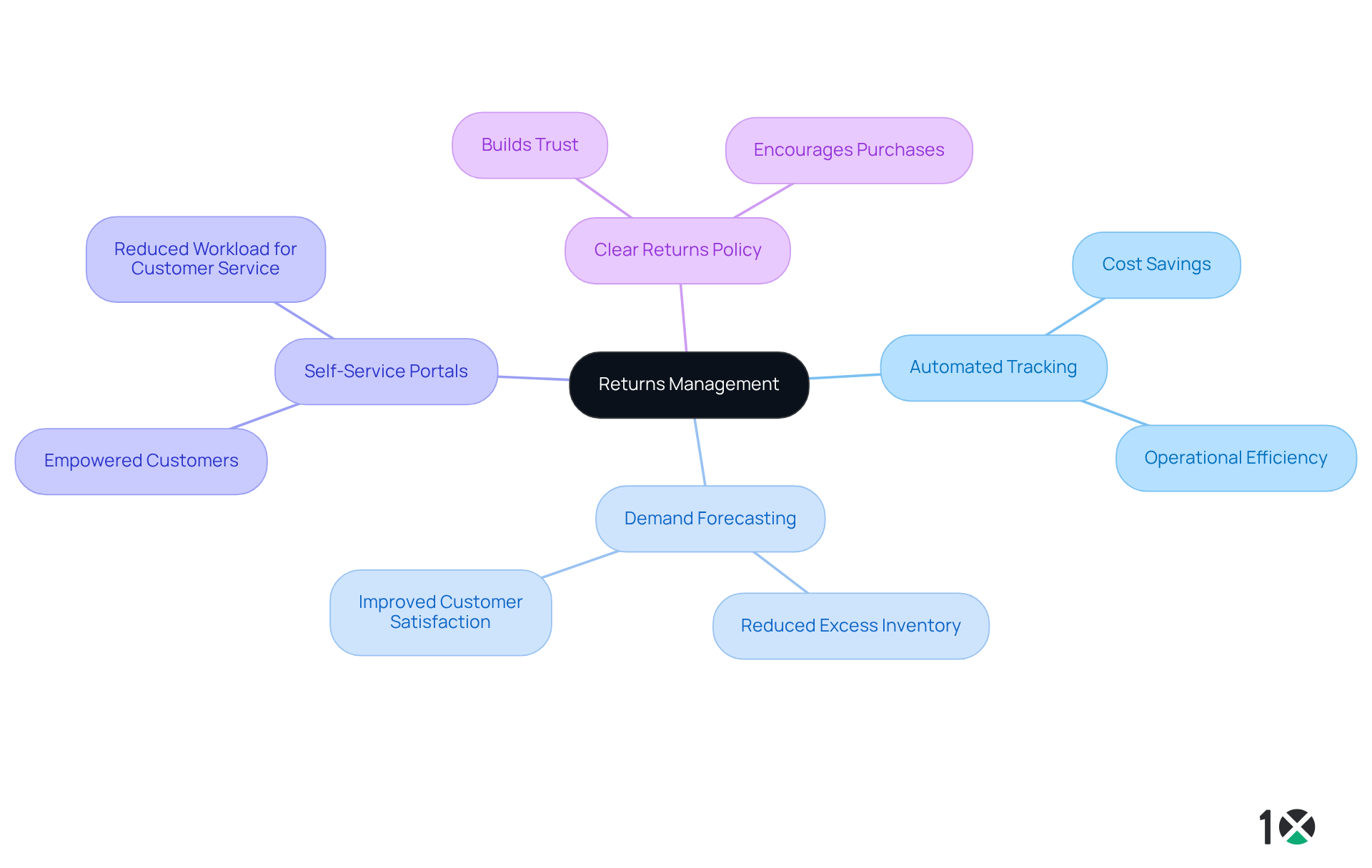
Conclusion
The landscape of retail supply chain management is evolving rapidly, driven by technological advancements and changing consumer expectations. Leveraging essential software solutions such as 10X ERP, Blue Yonder, and Oracle SCM significantly enhances operational efficiency, decision-making, and overall competitiveness. These tools empower businesses to respond swiftly to market dynamics, optimize logistics, and ultimately improve customer satisfaction.
Key insights reveal that real-time data processing, AI-driven analytics, and blockchain integration are not just trends but essential components for success in 2025. Companies investing in these technologies can expect substantial improvements in inventory management, cost savings, and enhanced traceability. Furthermore, the importance of sustainability and effective returns management cannot be overstated, as they play a critical role in meeting the demands of today’s environmentally conscious consumers.
Embracing these innovative solutions is vital for retailers aiming to thrive in a competitive market. By prioritizing advanced supply chain software, businesses can streamline operations and foster deeper connections with their customers. The call to action is clear: invest in the right tools and strategies to position your retail supply chain for success in the years to come.
Frequently Asked Questions
What is 10X ERP and what are its main features?
10X ERP is a 100% cloud-based retail supply chain software solution that offers robust real-time data processing capabilities. Its main features include flexible user permissions, built-in reporting, seamless integrations, and a transparent pricing structure.
How does 10X ERP benefit distributors?
10X ERP empowers distributors by providing up-to-the-minute insights into inventory levels, sales trends, and financial performance, allowing them to make informed decisions swiftly and respond proactively to market changes.
What security measures does 10X ERP implement?
10X ERP prioritizes data integrity and security through premium cloud hosting and continuous data backup, ensuring that distributors can manage their operations effectively with peace of mind.
What advantages does Blue Yonder offer for supply chain optimization?
Blue Yonder utilizes artificial intelligence to analyze historical data and forecast future trends, helping companies optimize inventory management, improve forecast accuracy by 12%, and reduce operational costs by 50%.
What are the financial implications of adopting Blue Yonder’s AI solutions?
While Blue Yonder’s AI solutions can lead to significant cost savings, companies often allocate 60-70% of their project budgets to data preparation, and 62% of AI initiatives tend to exceed their budgets.
How does Kinaxis enhance supply chain orchestration?
Kinaxis offers agile supply chain orchestration through its cloud-based ERP solutions, enabling operations managers to improve logistics with adaptable user permissions, a comprehensive audit trail, and integrated reporting capabilities.
What role do cookies play in 10X ERP?
Cookies are small text files that help 10X ERP remember user preferences and enhance the overall software experience, contributing to customizable tracking options and robust cross-referencing capabilities for precise inventory oversight.
How does 10X ERP impact customer satisfaction and profitability?
By leveraging advanced features for effective inventory control, 10X ERP allows distributors to significantly enhance customer satisfaction and improve profitability through better responsiveness to market changes.
